As the SPDC pushes forward with intensified military offensives in an attempt to secure areas near Burma’s new capital Pyinmana, as well as areas near potential dam sites along the Salween River (known as the Thanlwin River in Burma), thousands of civilians are being forced to flee their homes seeking refuge at camps like Ei Tu Ta.
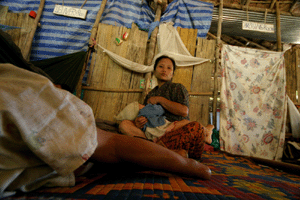 Gently curling an index finger around a lock of her youngest daughter’s hair, Naw Win stares gravely at the bamboo wall of her small temporary home, recalling the events that led to her husband’s death.
Gently curling an index finger around a lock of her youngest daughter’s hair, Naw Win stares gravely at the bamboo wall of her small temporary home, recalling the events that led to her husband’s death.
“They wanted him to act as their guide,” she says, “to show them the way to Karen hiding places in the jungle but he would not help them.”
At the time her husband was taken into custody, Naw Win was already living in hiding in the jungle. After her husband had been gone for three days, Naw Win, along with several other villagers, went to look for him.
“We found his body in a field the smell was terrible,” she says, cupping a hand over her nose and mouth. “He had been mutilated killed near Taperlu village. The SPDC had taken out his eyes, and cut off his ears and lips before killing him.”
Burma ‘s military-ruled government has long been accused by human rights groups of a wide range of abuses including forced labor, forcible relocation, rape, torture, extrajudicial killings – as well as torching and laying mines in villages.
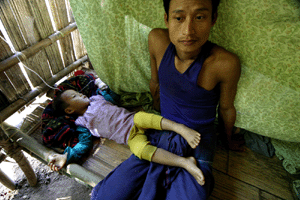 Eventually, with her three children, Naw Win made her way to Ei Tu Ta, a sprawling encampment of bamboo homes located on the border of Thailand in territory controlled by the Karen National Union (KNU). Along with 12 other Karen families, they walked for 12 days over difficult mountainous terrain, reaching Ei Tu Ta on August 6, 2006.
Eventually, with her three children, Naw Win made her way to Ei Tu Ta, a sprawling encampment of bamboo homes located on the border of Thailand in territory controlled by the Karen National Union (KNU). Along with 12 other Karen families, they walked for 12 days over difficult mountainous terrain, reaching Ei Tu Ta on August 6, 2006.
However appalling they may seem, stories like Naw Win’s are common in the refugee camps along the Thai-Burma border. Sometimes walking for more than three weeks at a time, groups of four to 400 men, women and children arrive almost daily at Ei Tu Ta, often emaciated and weak with malaria, bringing with them countless stories of government-sponsored human rights abuses.
Unfortunately, for the time being, the situation is not likely to improve. In November of 2006 Burma signed an arms deal with India which will provide the junta with attack helicopters, naval surveillance aircraft, and avionics upgrades of Burma ‘s Russian and Chinese manufactured fighter jets – all of which Human Rights Watch has warned will likely be used against civilians as the SPDC continues to battle insurgent groups.
Further strengthening its air-attack capabilities, Burma has also purchased a dozen MiG29 fighter jets from Russia, and continues to receive military assistance from China.
The United States, in contrast, appears to be cranking up pressure on Burma’s military junta. This week the U.S. circulated a UN Security Council draft resolution calling on the junta to release all political prisoners and cease utilizing rape as an instrument of war.
It’s a start. But, it may be too late.
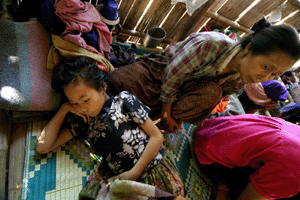 According to Human Rights Watch, more than 27,000 people have been forced to flee from SPDC offensives – as well as widespread human rights abuses – since January 2006. Over the last several months Ei Tu Ta has seen a dramatic increase in the number of ethnic Karen people seeking refuge there from SPDC assaults.
According to Human Rights Watch, more than 27,000 people have been forced to flee from SPDC offensives – as well as widespread human rights abuses – since January 2006. Over the last several months Ei Tu Ta has seen a dramatic increase in the number of ethnic Karen people seeking refuge there from SPDC assaults.
In November alone, more than 750 people fled to the camp – 500 of whom arrived during the last week of that month – bringing the total camp population to 2,424. Approximately 900 of those in the camp are children, ages 12 and under.
On the Thai side of the border there are an estimated 150,000 refugees living at nine long-established camps, though the number of unofficial refugees could be as many as 1.5 million. According to the Thailand Burma Border Consortium they have seen a 60% increase in the number of new arrivals, with as many as 900 arriving each month now.
Saw Yanshin, 41, from Myaungoo village near Mon township, has experienced the brutality of the SPDC firsthand. In 2002 he was arrested by the SPDC, beaten and tortured – an experience that left him blind in his left eye.
With the flat austerity of a man who’s come to accept what’s happened to him as commonplace, Yanshin describes his experience. “I was walking in a field with two friends when we saw the military. We tried to run, but my friends were shot and killed. I was captured and they accused me of being KNLA (Karen National Liberation Army) then they tortured me for two days and one night.”
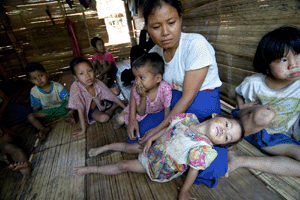 “They tied my hands behind my back, and then hung me from a tree. My feet could not touch the ground. The pain was excruciating.”
“They tied my hands behind my back, and then hung me from a tree. My feet could not touch the ground. The pain was excruciating.”
“During the day they would put a plastic bag over my head, making it difficult to breathe. They also put red ants on me. At night I was blindfolded and the soldiers would come to beat me, with clubs or the butts of their guns. That is how I lost my eye.”
As traumatizing as the experience was, Yanshin’s nightmare did not end with the loss of his eye. Afterward, he was imprisoned for three years. In 2005 he was released, only to be forcibly relocated just one year later to a work as a porter on a SPDC military base. Utilizing forced labor, the SPDC has built at least ten new army bases this year, as well as roads linking these areas and dam site areas.
The use of forced labor by Burma’s military government has been well-documented over the years. "Access roads are being built near dam sites. Often villagers are forcibly relocated from one area and then used as forced labor," said a spokesperson for the Karen Human Rights Group, “It’s quite common.”
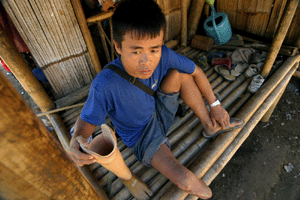 With a well-trained guerilla force of over 10,000, the KNLA are no rustic innocents, but it is clear that they are outmatched by the SPDC and cannot hold out forever. This year the KNLA – who have been fighting for an independent homeland for over 50 years – have experienced the junta’s most intense military operations against their people in more than a decade.
With a well-trained guerilla force of over 10,000, the KNLA are no rustic innocents, but it is clear that they are outmatched by the SPDC and cannot hold out forever. This year the KNLA – who have been fighting for an independent homeland for over 50 years – have experienced the junta’s most intense military operations against their people in more than a decade.
In previous years the SPDC has only carried out military operations during the region’s dry season. However, this year the government pushed forward through the rainy season, continuing their attacks on the Karen and other armed ethnic groups like the Shan and Karenni. Many observers believe that the SPDC is making a final push to wipe out the Karen in particular.
The reasons for the offensives are twofold – first, the SPDC is trying to secure areas around the newly established capital Pyinmana, situated only a few kilometers from the border of Karen State. Secondly, the offensives are aimed at securing areas along the Salween River where Burma, along with cooperation from Thailand and China, plans to build five hydroelectric dams.
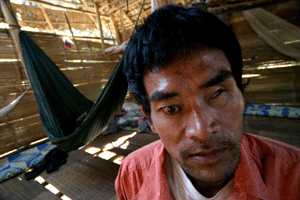 Several of the dam sites are in areas still hotly contested by insurgent conflicts, and for construction to move forward the SPDC must first clear the areas of groups like the KNLA. The first dam, to be built near Hat Gyi in Karen State with Chinese funding at a cost of over US$1 billion, is scheduled to begin ground-breaking in November 2007. That gives the SPDC a 10-month window to flush out Karen guerrillas and forcibly secure the area.
Several of the dam sites are in areas still hotly contested by insurgent conflicts, and for construction to move forward the SPDC must first clear the areas of groups like the KNLA. The first dam, to be built near Hat Gyi in Karen State with Chinese funding at a cost of over US$1 billion, is scheduled to begin ground-breaking in November 2007. That gives the SPDC a 10-month window to flush out Karen guerrillas and forcibly secure the area.
If built, the five dams along the Salween would cost over US$10 billion and would have the combined potential to produce 10,000-15,000 megawatts of power. Significantly, the dams would also provide a desperately needed source of income for Burma, money that would most likely be used for the further purchase of arms.
And as the SPDC gears up for its next military push – armed anew with Russian, Chinese and Indian technology – the Karen and other ethnic minorities living in the hinterlands of Burma likely face their most arduous dry season of offensives in more than a decade.
Get Involved or Make a Donation:
There are a number of NGOs working on behalf of the Karen and other minority groups fleeing oppression in Burma. Most of these operate out of Mae Sot, Mae Sariang and Chiang Mai.
To make a donation to refugees at the Ei Tu Ta camp, contact Saw Peter, Camp Commander, at +66 (0) 81-281-0513, or contact the Committee for Internally Displaced Karen People at +66 (0) 86-208-3131.
Further Contacts:
Karen Refugee Committee: +66 (0) 5368-2879
ZOA Refugee Care: +66 (0) 5368-1040, +66 (0) 87-841-8106, [email protected]
Free Burma Rangers: [email protected]
Karen Teacher Working Group: +66 (0) 5368-1440, [email protected]
All photos by Will Baxter.
